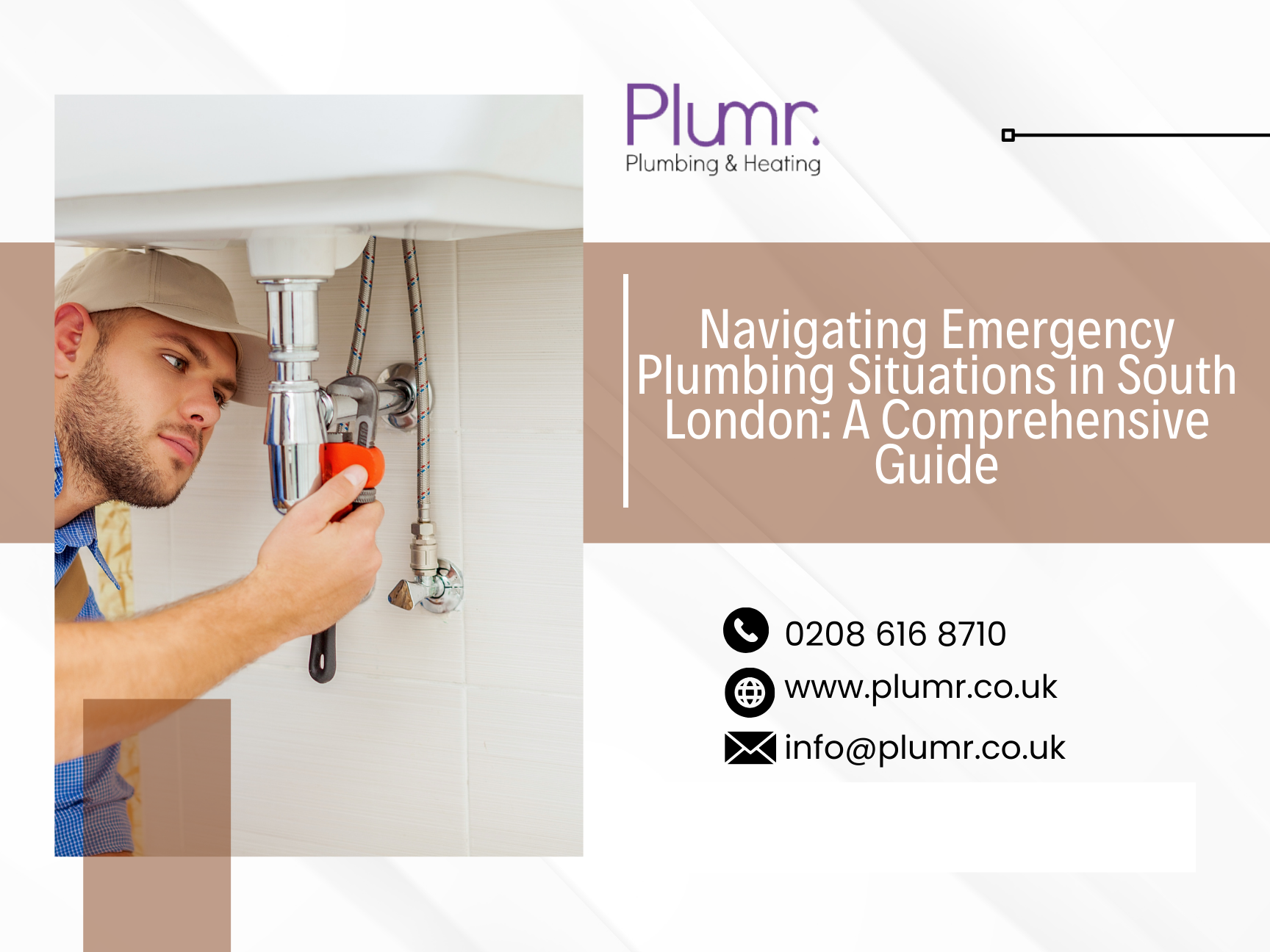Introduction
In the bustling urban landscape of South London, plumbing emergencies in South London can strike at any time, requiring swift and practical solutions. This article aims to guide homeowners through the intricacies of handling emergency plumbing situations in the region. Being prepared and informed is crucial, whether it’s a burst pipe, a stubborn clog, or a leaky faucet. Read on to discover actionable steps, local services, and preventive measures to safeguard your home.
Understanding Emergency Plumbing in South London
South London presents unique challenges when it comes to plumbing emergencies. Factors like aging infrastructure and diverse property types contribute to specific issues. From leaks in Wimbledon to clogs in Croydon, understanding the common plumbing problems in the area is the first step towards effective management.
Preparing for Emergency Plumbing Situations
Proactive homeowners can minimize the impact of plumbing emergencies by preparing ahead. Create an emergency plumbing kit, conduct regular maintenance, and familiarize yourself with the location of the main shut-off valves. These simple steps can make a significant difference in mitigating potential damage.
Identifying Common Plumbing Emergencies
Recognizing the signs of common plumbing emergencies in South London is essential for a prompt response. Whether it’s a burst pipe or a hidden leak, this section provides insights into identifying the severity of each situation. Visual aids enhance understanding, empowering homeowners to act decisively.
Step-by-Step Response Plan
1. Assessment
The first step in dealing with any plumbing emergency is to remain calm and assess the situation promptly. Panicking can lead to hasty decisions and increased damage. Take a moment to observe and identify the nature and severity of the plumbing issue. Ask yourself:
- Where is the water coming from?
- Is there any visible damage or leakage?
- Are there any electrical hazards present?
A quick and accurate assessment provides a foundation for the subsequent actions, helping you make informed decisions.
2. Isolation
Once you’ve assessed the situation, isolating the problem is crucial to prevent further damage. It involves knowing how to shut off your home’s water, gas, and electricity supply. Follow these steps:
Water Supply:
- Locate the main shut-off valve. It’s typically near the water meter or the main water line that enters your property.
- Turn the valve clockwise to shut off the water supply to your entire home.
Gas Supply:
- If you suspect a gas leak, immediately evacuate the premises.
- Locate the gas shut-off valve outside your home and turn it off.
- Only re-enter the property once it has been deemed safe by professionals.
Electricity:
- If water is in contact with electrical outlets or appliances, turn off the electricity at the main breaker box.
- Exercise extreme caution and, if unsure, wait for professional assistance.
3. Temporary Fixes
In some cases, implementing safe, temporary solutions can help mitigate the immediate impact of a plumbing emergency. However, it’s crucial to remember that these fixes are temporary and should not replace professional assistance. Common temporary fixes include:
- Use pipe clamps or pipe repair tape for small leaks.
- Placing buckets or towels to protect water from leaks.
- Clearing clogs with a plunger or plumbing snake.
Avoid DIY fixes for complex issues and prioritize safety over temporary solutions.
4. Contacting Professionals
After isolating the issue and implementing temporary fixes, it’s time to contact reliable emergency plumbers in South London. Prompt professional intervention is crucial for resolving the root cause of the problem and preventing further damage. Follow these steps:
- Have a list of emergency plumbing services in South London readily available.
- Call the professionals and provide clear information about the issue.
- Ask about their response time and any immediate steps you can take while waiting for their arrival.
5. Documenting the Situation
Before professionals arrive, document the plumbing emergency for insurance purposes. This documentation serves as evidence for claims and ensures a smoother process. Here’s what to do:
- Take clear photos or videos of the affected areas.
- Note the time, date, and any relevant details about the emergency.
- Keep a record of any temporary fixes implemented.
This documentation will be valuable when dealing with insurance claims or seeking reimbursement for damages.
Tips for Preventing Future Emergencies
To avoid future plumbing crises, consider these tips:
- Regular maintenance practices.
- Professional inspections.
- Homeowner-driven preventive measures.
Conclusion
In the dynamic landscape of South London, where the rhythm of city life beats fervently, the spectre of plumbing emergencies is an ever-present reality. This comprehensive guide has endeavoured to empower homeowners with the knowledge and strategies to navigate the unexpected twists and turns of burst pipes, leaks, and clogs.
By understanding the unique challenges posed by plumbing emergencies in South London and adopting a proactive stance, residents can transform moments of crisis into opportunities for swift, effective resolution. From creating emergency kits to mastering the step-by-step response plan, the importance of preparedness cannot be overstated.
The information presented here is not just a guide but a call to action. As residents of South London, take the initiative to fortify your homes against potential plumbing crises. Remember, a burst pipe in Wimbledon or a leak in Croydon demands a swift, informed response.
In conclusion, being prepared for plumbing emergencies in South London is not just a choice but a necessity. By following the outlined steps and tips, homeowners can confidently navigate unexpected situations. Remember, quick and informed action can make all the difference in minimizing damage and ensuring a swift resolution.
Frequently Asked Questions (FAQs) :
1. What are the common plumbing emergencies in South London?
Ans: Common plumbing emergencies in South London include burst pipes, leaks, clogged drains, and malfunctioning water heaters. Understanding these issues is crucial for prompt action.
2. Are there 24-hour emergency plumbers in London?
Ans: Yes, there are reputable 24-hour emergency plumbers in London. We recommend having their contact information on hand for swift assistance during any plumbing crisis.
3. How do I identify the severity of a plumbing emergency?
Ans: Assess the situation by checking for water damage, the extent of leaks, or unusual sounds. If in doubt, consider it an emergency and take immediate action to prevent further damage.
4. What should I do in case of a burst pipe in Wimbledon?
Ans: If you experience a burst pipe in Wimbledon, immediately shut off the water supply using the main shut-off valve. Call a 24-hour emergency plumber in London for professional assistance.
5. Is it safe to attempt temporary fixes for plumbing emergencies?
Ans: While temporary fixes can be implemented for minor issues, it’s crucial to prioritize safety. Avoid DIY solutions for complex problems, and always seek professional help for a long-term resolution.
6. How do I shut off the water supply in an emergency?
Ans: Locate the main shut-off valve, usually near the water meter. Turn the valve clockwise to shut off the water supply to your entire home. Knowing this essential step can prevent extensive water damage.
7. What information should I provide when calling an emergency plumber in Croydon?
Ans: When calling an emergency plumber in Croydon, be prepared to provide your address, a brief description of the issue, and any relevant details about the plumbing emergency. This information helps them assess the situation quickly.
8. Why is documenting the plumbing emergency critical for insurance purposes?
Ans: Documenting the plumbing emergency with photos and notes provides evidence for insurance claims. It helps establish the extent of the damage and the steps taken to address the situation.
9. How can I prevent future plumbing emergencies in my home?
Ans: Regular maintenance, professional inspections, and proactive measures like installing leak detectors can help prevent future plumbing emergencies. Stay informed about the condition of your plumbing system.
10. Are there specific emergency plumbing services recommended for South London residents?
Ans: We provide recommendations for reliable emergency plumbing services in South London. These services are known for their prompt response and quality solutions to plumbing issues.



